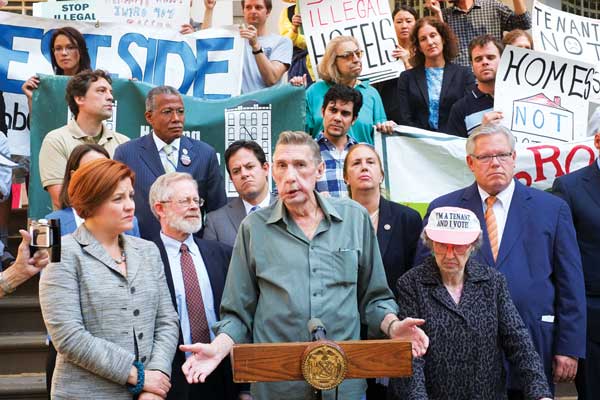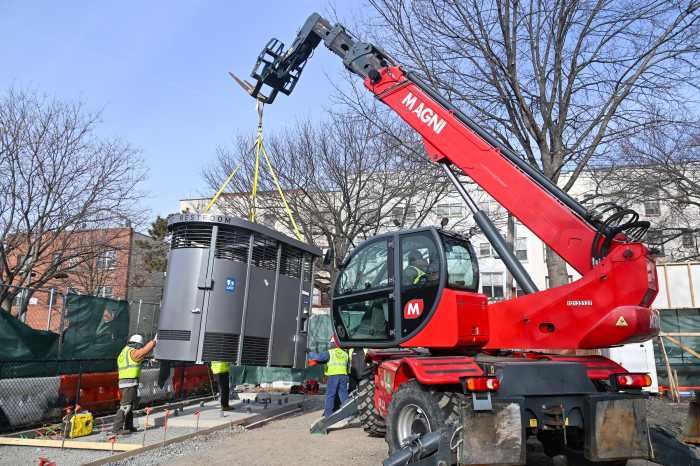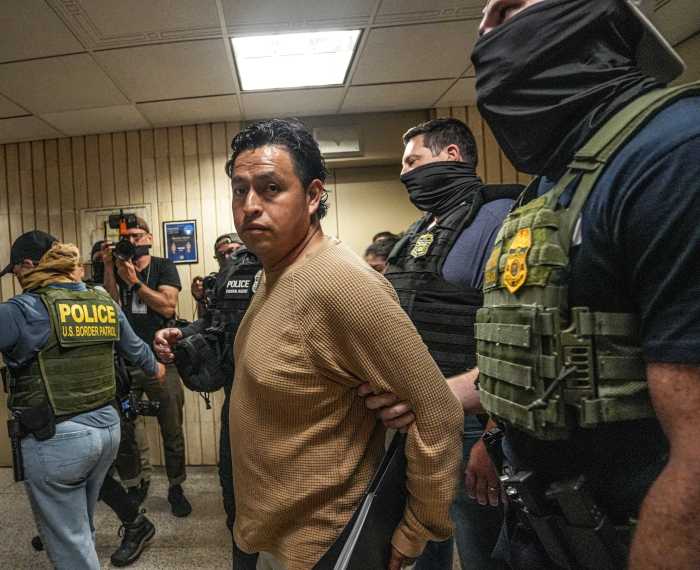
BY SAM SPOKONY | Trying to rein in an industry that its critics say is putting both residents and tourists at risk, the City Council passed a bill last week increasing fines against landlords who convert residential apartments into illegal hotel rooms.
But some of the major players in what has become a booming industry remain unfazed by the legislation, which was approved on Sept. 12 by a 38-to-5 vote. The head of a New York City-based illegal hotel operator — one with a sizable presence in the East Village and Lower East Side — even went so far as to claim that his business model represents the next step in the hospitality industry.
The Council’s bill, set to go into effect 60 days after an expected O.K. from Mayor Bloomberg, places owners of unlawfully converted units at risk of receiving fines from $1,000 to $25,000 — a significant step up from the current penalties, which range from $800 to $2,400. The new rules would also allow enforcement agencies to hit illegal hotels with “immediately hazardous” violations, and could include continual daily fines for noncompliance rather than one-time charges.
“Time and time again, we hear from residents who have been pushed out of their homes by landlords looking to make a quick buck,” said Council Speaker Christine Quinn. “Our legislation will make sure there are immediate and severe consequences for landlords who endanger the safety of residents and tourists and take away affordable housing from New Yorkers in need.”
The city has received more than 1,000 complaints about unlawful hotel conversions since last May, when a state law went into effect that established the illegality of rentals lasting less than 30 days in Class A residential apartments.
Along with general quality-of-life issues that the illegal hotels cause for residents — loud noise, excessive piles of trash or security concerns, among others — many of the illegal units have been equally hazardous for the tourists who use them. The illegal hostels often lack requirements, such as sprinklers, fire alarms and additional exits in case of emergency.
John Reynolds, the chief operating officer of Smart Apartments, believes that the Council’s new bill is fundamentally unfair. His company books vacation rentals — most of which last less than 30 days — in residential units through its Web site, as well as managing “hotel” service for its tourist clients.
“There are better ways of going about this than passing blanket legislation that completely vilifies the industry,” Reynolds said. “We all know that New York is driven by tourism, and our model can be a better avenue for many tourists who can’t afford high hotel prices.”
Smart Apartments is a reincarnation of the defunct company Hotel Toshi, which had become a notorious illegal hotel operator, racking up violations and angering residents in neighborhoods across the city in recent years. Although the newly branded outfit is, for all intents and purposes, virtually the same as Toshi — it handles the same properties and uses the same model — Reynolds asserted that he has been “changing the face” of the organization by implementing stricter security policies.
“Since I came on board in March, we’ve been working hard to educate [tourists] about how they should conduct themselves, and we now have a security detail that does periodic checks in the rental units,” he said.
When asked how the steep fines in the Council’s new legislation would affect his ability to keep operating unlawfully, Reynolds did not give any direct answers, but he didn’t give the impression that he planned to cease operating his business as usual.
One of the motivations behind the new bill is that small fines have provided no real incentive for illegal hotel operators to shut down, and this has apparently been the case for Smart Apartments.
The company currently advertises heavily for vacation rentals in residential units in both the East Village and Lower East Side, among other neighborhoods. The owners of apartments at 325 E. 10th St., 317 Second Ave., 79 Clinton St., 171 Mulberry St. and 157 Suffolk St. have all been slapped with violations for illegal hotel use this year, according to city Department of Buildings records. Yet, units in all of these buildings remain available for visiting tourists, and can currently be booked for short stays through smartapartments.com.
In all of those violations, the owners were also cited for creating unsafe conditions by failing to provide adequate means of egress, fire alarms, sprinklers or emergency exit signage.
Aside from wrist-slap fines, another problem has been a seeming lack of sufficiently swift enforcement. The city issued 1,897 violations for illegal hotel conversions in 2011 — a 244 percent increase above 2010 — and vacated an additional 55 locations for immediately hazardous conditions, according to a spokesperson from the Mayor’s Office. Yet, many more owners of the illegal units slip through unscathed.
Smart Apartments advertises for short-term rentals in multiple units at 8 Centre Market Place and 70-80 Kenmare St. — and while several conversion-related complaints about the locations were received in 2010, 2011 and 2012, they have either not been investigated or have not led to violations.
Tom Cayler, chairperson of the Westside Neighborhood Alliance’s Illegal Hotel Committee, meets at least once each year with personnel from the Mayor’s Office of Special Enforcement, the agency assigned to investigate illegal-hotel conversions. Cayler explained that while O.S.E.’s dedication to enforcing the law is unwavering, their manpower seems extremely small when compared to the number of units held by the illegal hotel industry.
“They’re 100 percent committed,” Cayler said, “but my understanding is that, within the O.S.E., there are only a few building inspectors. It also takes a good deal of time to get them into a building, and to eventually prove that a given unit has been illegally converted.”
An O.S.E. representative could not be reached for comment by press time.
In what he admitted was a rough estimate, Smart Apartments’ Reynolds said he believes there are roughly 10,000 residential units currently being used as vacation rentals throughout the city.
City Councilmember Rosie Mendez, whose district includes the East Village and part of the Lower East Side, said that passage of the Council’s new bill will be vital not only because of quality-of-life concerns, but also because of the additional strain illegal hotels place on the city’s housing situation.
“The problem with this industry is that they’re taking away rental apartments for residential use, in a city and an economy where the housing market is already in a lot of trouble,” Mendez said. “This is just making it worse, and we have to stand up against it by making the fines substantial enough to cause owners to actively modify their behavior and start complying.”
She added that this fight is certainly not over as long as operators like Smart Apartments, as well as other vacation rental companies, like the popular Web site Airbnb.com, continue to flout the law. Along with increasing fines, Mendez explained that another approach may be to investigate other legal tactics against illegal hotel operators, such as setting a point at which repeated civil penalties could actually result in jail time for offenders.
While discussion about new legislation of that nature hasn’t been formally discussed yet in the Council, Mendez noted, “Some of us would be very interested in exploring that approach.”
One resident of 325 E. 10th St., which has been a multiple-unit mainstay for Smart Apartments, and its predecessor, Hotel Toshi, for several years, expressed his frustration with his landlord’s apparent disregard for the building’s actual tenants.
“It pisses me off,” he said, asking to remain anonymous. “And it’s been happening with increasing frequency over the course of the year that I’ve lived here so far.”
The resident explained that the biggest problem faced at his building is the great sense of unease that comes along with the strangers who attempt to enter the door without really knowing where they are, or who don’t understand the dangers of leaving the door open for potential intruders.
“Some guy buzzed my door the other day,” the man said, “and I came out and asked him, ‘Who are you?’ All the guy said was that he was trying to get in. He couldn’t tell me what apartment he was looking for. And I’m like, ‘Why should I let you in?’ But he just kept trying.”
The resident, who was unsure whether the short-term rentals were legal or not, was visibly relieved when this reporter told him that they are, in fact, illegal in New York City.
“I always thought it was illegal,” he said. “It just feels wrong.”






























